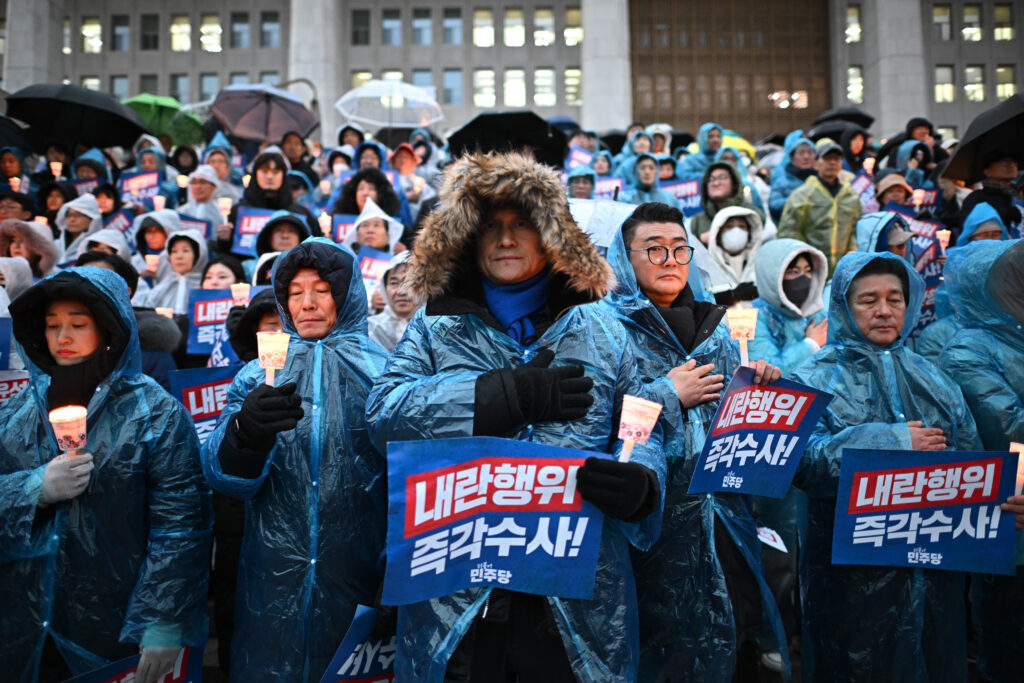South Korean President Yoon Suk Yeol clung to power Thursday, with his party announcing they will oppose an impeachment motion after his short-lived imposition of martial law stunned the world.Yoon suspended civilian rule late Tuesday and deployed troops and helicopters to parliament only for lawmakers to vote down the measure and force him into a U-turn in a night of protests and drama.Seoul’s allies were alarmed — Washington said it found out via television — and the opposition quickly filed an impeachment motion saying Yoon “gravely violated the constitution and the law”. A vote is set for Saturday at around 7:00 pm (1000 GMT).The opposition holds a large majority in the 300-member legislature and requires only a handful of defections from Yoon’s People Power Party (PPP) to secure the two-thirds majority needed for impeachment.But on Thursday, PPP leader Han Dong-hoon said that while he had demanded Yoon leave the party over his “unconstitutional martial law”, he would block the impeachment motion.”All 108 lawmakers of the People Power Party will stay united to reject the president’s impeachment,” party floor leader Choo Kyung-ho said.Main opposition leader Lee Jae-myung told Bloomberg that deposing Yoon could still be a challenge.The situation remains in a “state of flux”, Lee said.According to a poll issued Thursday by Realmeter, 73.6 percent of respondents supported the impeachment. Thousands of protesters continued to rally in central Seoul and near the parliament on Thursday evening demanding the president step down.If the impeachment motion passes, Yoon will be suspended pending a verdict by the Constitutional Court. If the judges give the nod, Yoon will be impeached and new elections must take place within 60 days.- Bad memories -Yoon, who has lurched from crisis to crisis since taking office in 2022, has not been seen in public since his televised address in the early hours of Wednesday.Local media quoted his office as saying he would not make any statement on Thursday.On Thursday, his office said that Defence Minister Kim Yong-hyun had resigned, but other key allies, including Interior Minister Lee Sang-min, remain in office.Prosecutors have also banned Kim from leaving the country, Yonhap news agency reported.Lawmakers, meanwhile, were grilling senior figures, including army chief of staff General Park An-su, who acted as Yoon’s martial law commander.Park said Thursday that he was kept in the dark until after the president had announced the imposition of martial law on live television late Tuesday.It was the first such declaration in more than four decades in South Korea and brought back painful memories of its autocratic past.The move was to “safeguard a liberal South Korea from the threats posed by North Korea’s communist forces and to eliminate anti-state elements plundering people’s freedom and happiness,” Yoon said.Security forces sealed the National Assembly, helicopters landed on the roof and almost 300 soldiers tried to lock down the building.But as parliamentary staffers blocked the soldiers with sofas and fire extinguishers. Enough MPs got inside and voted down Yoon’s move.This brought cheers from the hundreds of protesters braving bitter temperatures outside, many chanting for Yoon to be arrested.Lawmakers formally presented the impeachment motion in the early hours of Thursday, saying Yoon’s decision to impose martial law was intended to “evade imminent investigations… into alleged illegal acts involving himself and his family”. “This is an unforgivable crime — one that cannot, should not and will not be pardoned,” MP Kim Seung-won said.- World reacts -US National Security Advisor Jake Sullivan said Wednesday that Yoon’s imposition of martial law had “raised deep concern for us”, while praising the National Assembly for operating “according to constitutional processes and procedures” to rescind it.China, a key ally of nuclear-armed North Korea, urged its citizens to exercise caution, while Russia — increasingly close to Pyongyang — called the situation “alarming”.In Japan, where historically prickly relations with Seoul have thawed under Yoon, Prime Minister Shigeru Ishiba discussed the situation with key ministers and the national security advisor, Tokyo said Thursday.”Japan and South Korea are important neighbours that should tackle, as partners, various issues facing the international community,” government spokesman Yoshimasa Hayashi said.burs-oho/lb
Thu, 05 Dec 2024 11:26:01 GMT
